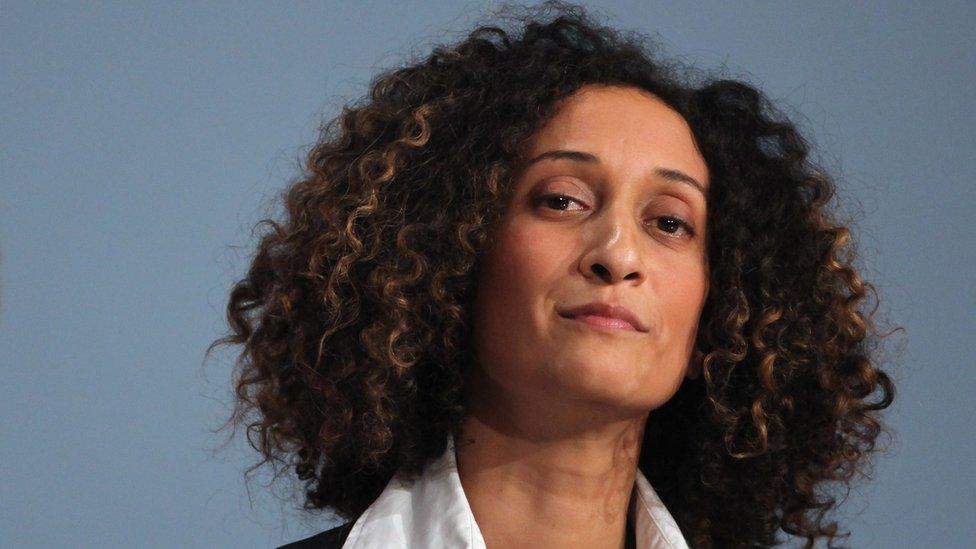Success not all about getting to top, says social mobility chief Birbalsingh
- Published

Katharine Birbalsingh wants a rethink on attitudes towards social mobility
Stop fixating on getting poor children to university and celebrate "small steps up the ladder", Boris Johnson's social mobility chief has said.
Katharine Birbalsingh has been given the job of helping people born poor in the UK get more chances to succeed.
In her first major speech, she called for a different way of measuring success in life.
It was not just about "the person who is born into a family in social housing and becomes a banker or CEO", she said.
Ms Birbalsingh, who is chair of the Social Mobility Commission, called for more to be done to ensure "a route to high skills" for young people not going to university.
Research published by the commission last year suggested that 79% of adults across the UK thought there was a large gap between social classes.
And 39% of those questioned said it was from less advantaged backgrounds to move up in society, while 23% said it was becoming easier.
Ahead of Ms Birbalsingh's speech, the commission said public discussion of social mobility was "too fixated with a small minority of people from poor backgrounds getting into the best universities and elite professions".
"Too often success has been defined as a caretaker's daughter going to Oxbridge and becoming a top surgeon," it added, saying Ms Birbalsingh thought that "more attention should be given to those people taking small steps up the ladder - from the bottom and from the middle rungs".
For instance, "the son of a postman becoming a branch manager; the daughter of a care worker becoming a primary school teacher" should be celebrated, the commission said.
In her speech, Ms Birbalsingh, who is also head teacher of Michaela Community School, in north-west London, said: "We want to move away from the notion that social mobility should just be about the 'long' upward mobility from the bottom to the top."
Answering questions afterwards, she said: "We imagine this idea that, oh, everyone needs to get to Oxbridge, everyone needs to be this top lawyer in the City.
"But in fact the reality is that we have a variety of children with a variety of different talents."
Levelling up?
In an interview with the “óĻó“«Ć½ last year, Sir Peter Lampl, founder of the Sutton Trust social mobility foundation, said he thought social mobility was going into reverse, blaming widening inequality and failings in education.
Responding to Ms Birbalsingh's speech, the trust's chief executive, James Turner, agreed that social mobility was "certainly not only about access to the elites".
"But it is also crucial that we make sure that young people from low and moderate income backgrounds gain access to the most selective schools, universities and professions," he added.
In its 2019 general election manifesto, the Conservative Party promised to "level up" the UK, part of which involved improving opportunities for children, irrespective of background.
In March last year, chancellor Rishi Sunak announced Ā£126m in funding for work placements and training for 16 to 24-year-olds in England.
But, in May this year, Levelling Up Secretary Michael Gove warned that rapidly rising prices were making plans to reduce regional inequality more difficult.
Labour responded by calling on the government to "put more money in people's pockets urgently".